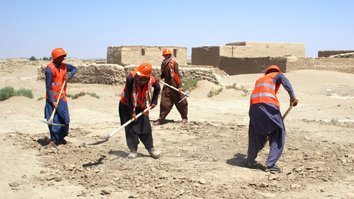SAMANGAN -- The Central Afghanistan Welfare Committee (CAWC) has handed over a water supply project funded by Norway to beneficiaries in Firoz Nakhchir district of Samangan province.
The project, which cost $91,000 (8.1 million AFN) to complete, was completed in six months and handed over to its beneficiaries on January 23.
Some 630 households in the villages of Sar Sofa, Hayatabad and Khwajagai villages now have access to clean drinking water thanks to the project, said Sayed Mustafa Mousavi, director of the CAWC for Afghanistan's northern regions.
The project included the digging of three 70-metre deep wells, the construction of three water reservoirs with a capacity of 45 cubic metres, the extension of the network to 100 water taps and the installation of solar power systems and water pumps, he added.
![This photograph taken on January 6 in Firoz Nakhchir district, Samangan province, shows solar panels that provide electricity to a newly built water supply system. [Central Afghanistan Welfare Committee]](/cnmi_st/images/2023/02/10/40694-a__7_-585_329.jpg)
This photograph taken on January 6 in Firoz Nakhchir district, Samangan province, shows solar panels that provide electricity to a newly built water supply system. [Central Afghanistan Welfare Committee]
"The scheme uses solar energy to pump water and to fill the reservoirs. Water is distributed to specific villages through pipes," he said.
"The residents of these areas were, unfortunately, facing severe water shortages in the past. Now that they are connected to the water supply network, they can take clean water for free from the nearest water tap or pipe to their homes," Mousavi said.
"The project was implemented to provide clean drinking water to local residents who suffer from water shortages," he added.
A critical challenge
Local residents, who previously had to fetch water from rivers and canals up to 5km away, have welcomed the project.
Irfanullah, 54, a resident of Firoz Nakhchir district, said before the project was completed, he would fetch water from 4km away by donkey.
"I do not have a grownup son, and for years I had to fetch water for my family from the river ... I know that water from the river and canals is not healthy, but we had no other option," he said last Saturday (February 4).
"Some days the river water would be clear, but other times, floods would make the water muddy. We had to leave the water for hours to allow the mud to settle and would then use the water," he said.
"We did not have clean drinking water in our village before and would walk for hours to fetch water from the river, which was not even clean," said Mohammad Musa Bashash, another resident of Firoz Nakhchir district.
"The lack of water unfortunately was an issue for years. We reached out to the authorities many times, but no one addressed it," he said.
"We are very happy now," he added.
Residents of various villages used water not only from rivers but also standing water like rainwater and ponds, which regularly caused diseases, Musa added.
Development and reconstruction
Aid agencies have implemented critical projects in recent months in the province, said Juma Khan Akbari, a tribal elder in Samangan.
"In the past one and a half years, in addition to addressing the people's environmental problems, aid agencies, especially the [United Nations], have fortunately created work opportunities for thousands of people," he told Salaam Times.
"Irrigation canals, bridges, transport routes, water supply schemes, retaining walls, health clinics and schools are some of the critical projects that have fortunately been implemented in Samangan," he added.
"There is still great need for such projects," he said.

![Local residents gather on January 6 in Hayatabad village, Firoz Nakhchir district, Samangan province, to get drinking water from a newly constructed water supply system funded by Norway. [Central Afghanistan Welfare Committee]](/cnmi_st/images/2023/02/10/40693-a__6_-585_329.jpg)







It is good that in the construction field, where only one brick is placed on another, the benefits are shared, and the benefits reach the people at the village, district, and province levels.
Reply3 Comment
Water is a vital substance for living things; if it is not available, no one can survive more than one night and day. And then, a human needs clean water among living things. If this is not done, they may suffer from various diseases. Unfortunately, diarrheal diseases that have occurred recently are due to the lack of clean water. So those who do such things are worthy of gratitude and appreciation. We, poor people, can say nothing but thank you because we have spent our whole life in war and have not lived a life.
Reply3 Comment
In the current year, the best vital projects in Samangan Province have been implemented by foreign organizations. Fortunately, these organizations built irrigation canals, bridges, schools and health clinics in Samangan province, which are all vital works that the people of this province have been using for many years.
Reply3 Comment